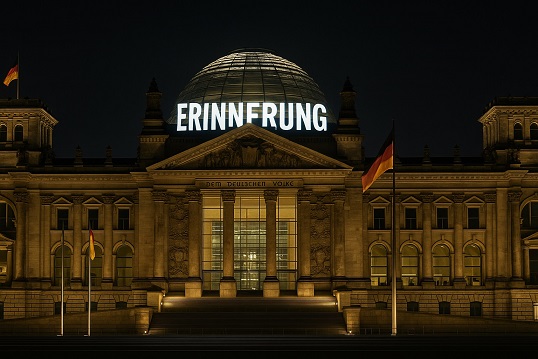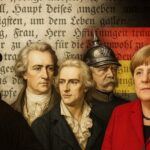
Few nations in the world confront their history as directly, consistently, and painfully as Germany. From the crimes of the Nazi regime to the division of East and West during the Cold War, the weight of the past is a constant presence in German life. Yet rather than hide from it, Germany has built a unique memorial culture (Erinnerungskultur) – one that not only honors victims but also shapes the country’s very identity.
Understanding how Germany handles its past is essential to understanding modern German values. It reveals why the nation is deeply committed to democracy, pacifism, human rights, and education. It also shows how memory, far from being static, is debated, contested, and reinterpreted with each generation.
The Burden of the Nazi Past
The darkest chapter in Germany’s history is undoubtedly the period of National Socialism (1933–1945). The Holocaust, the war of aggression, and the mass destruction it caused left scars not only on the world but also on Germany’s sense of self.
In the immediate aftermath of 1945, many Germans struggled with denial, silence, or selective memory. Families often avoided speaking about their role, while political leaders in West and East Germany offered simplified narratives to move forward.
But from the 1960s onward, especially as younger generations confronted their parents, the silence broke. Public trials, television documentaries, and student protests forced a reckoning. This generational shift laid the foundation for today’s culture of remembrance.
Memorial Culture in Public Life
Walk through any German city, and you will encounter visible reminders of history. These are not triumphal monuments but sober, often understated memorials designed to provoke reflection.
- Stolpersteine (stumbling stones): Small brass plaques embedded in sidewalks outside former residences of Holocaust victims, listing their names and fates.
- Memorial to the Murdered Jews of Europe: In Berlin, a vast field of concrete slabs invites contemplation rather than spectacle.
- Concentration camp memorials: Sites like Dachau, Buchenwald, and Sachsenhausen have been preserved as places of education and mourning.
These memorials are not about pride – they are about responsibility. They remind Germans daily of the consequences of dictatorship, racism, and violence.
History in the Classroom
One of the strongest aspects of Germany’s response to its past is education. Holocaust studies are mandatory in schools, and students visit former concentration camps as part of their curriculum. Textbooks address not only Nazi crimes but also the complexities of German division, the GDR’s authoritarian system, and the legacy of colonialism.
The aim is not just to transfer facts, but to cultivate critical thinking and moral responsibility. Teachers encourage students to ask difficult questions: How did ordinary people allow such crimes to happen? What can be done to prevent them in the future?
This focus on remembrance ensures that the past is not only remembered but also tied directly to present values.
Vergangenheitsbewältigung: Coming to Terms with the Past
The German word Vergangenheitsbewältigung – literally, “coming to terms with the past” – has no easy English equivalent. It refers to the collective effort to process, acknowledge, and learn from history.
This effort is not a one-time event but an ongoing process. It encompasses public debates, literature, films, art, and political decisions. Each generation revisits the past in its own way, questioning what has been remembered and what has been forgotten.
For example, while Holocaust remembrance has been central since the 1960s, debates about Germany’s colonial past in Africa are more recent. Statues, street names, and museum collections are now being reassessed in light of colonial crimes.
The Cold War and Division Memory
Germany’s 20th-century past is not only about the Nazis. The division into East (GDR) and West (FRG) also left a lasting legacy. After 1989, reunification brought not only celebration but also tension. Many East Germans felt their experiences under socialism were misunderstood or dismissed.
Today, memorials like the Berlin Wall Memorial and museums on the Stasi (secret police) document this chapter. They remind citizens that repression did not end in 1945, but continued in different forms during the Cold War.
The effort to integrate both histories – Nazi dictatorship and communist dictatorship – into a shared narrative remains an ongoing challenge.
Why Germany Confronts Its Past So Openly
What makes Germany’s approach unique is the conscious decision not to bury history but to expose it. This openness serves several purposes:
- Moral responsibility: To honor victims and acknowledge wrongdoing.
- Democratic foundation: To ensure that the horrors of dictatorship are never repeated.
- International trust: Facing history has been essential to Germany’s reintegration into the global community after WWII.
- Cultural identity: Modern Germans see themselves not as proud of their history, but as responsible custodians of its lessons.
In contrast to nations that emphasize glory and victory, Germany emphasizes caution and remembrance.
The Ongoing Debate
Of course, remembrance is not without controversy. Some argue that focusing too much on guilt prevents Germany from developing a “normal” sense of patriotism. Others worry that younger generations, more distant from WWII, may grow tired of constant reminders.
Yet surveys consistently show that most Germans support a strong culture of remembrance. The idea of “Never Again” (Nie wieder) remains central to the national ethos.
Germany’s approach to its past has inspired global discussions on how nations deal with historical trauma. From South Africa’s Truth and Reconciliation Commission to debates about slavery and colonialism in the U.S. and Europe, Germany is often cited as an example of how confronting history can strengthen democracy.
It is not a perfect model – but it demonstrates that acknowledging the darkest chapters of history can lead to a stronger, more resilient national identity.







